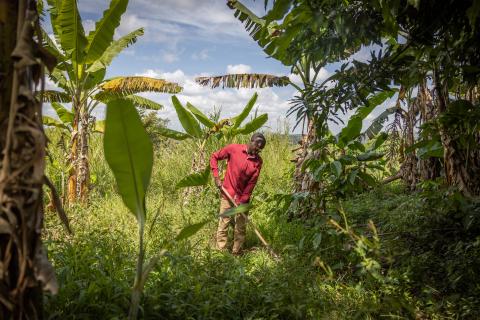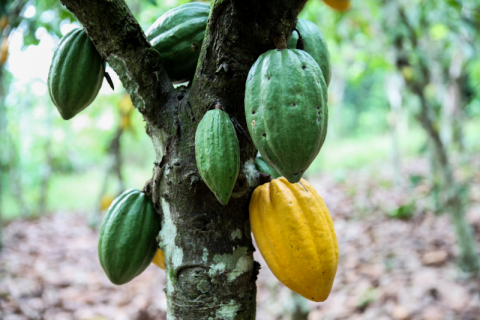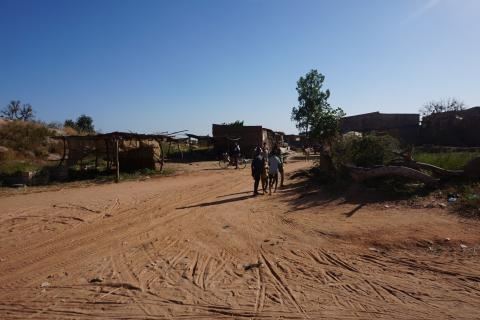
Topics and Regions
Details
Location
Contributions
Displaying 81 - 90 of 128Promoting Responsible Governance of Investments in Land (RGIL) in Uganda
The “Responsible Governance of Investments in Land” (RGIL) project in Uganda fosters investment quality promotion to ensure that agriculture and forestry investments in land are productive, contribute to sustainable land management and respect the rights and needs of local populations, including vulnerable groups and women.
Promoting Responsible Governance of Investments in Land (RGIL) in Ethiopia
The “Responsible Governance of Investments in Land” (RGIL) project in Ethiopia aims at ensuring that investments in land are productive, contribute to sustainable land management, and respect the rights and needs of local populations, in particular vulnerable groups and women.
New Newsletter on GIZ Land Governance
In August 2021, a newsletter covering various land governance programmes of GIZ was launched. This newsletter is available for everybody who is interested and informs about current development within GIZ land governance and beyond. The three main programmes responsible for the newsletter are:
Responsible Land Policy in the Ivory Coast
General
Context The Ivory Coast is the largest cocoa producer in the world, and about 10% of GDP and 15% of government revenues are generated in this sector. However, as of July 2017, only 0.5% of the total agricultural land had a land certificate. At the same time, due to population growth the pressure on land increases. With a change of the forest law in 2015, the owners of land are also the owners of the trees planted on it. However, current land use contracts often remain informal and unclear. If land users for instance grow cocoa trees on the land they cultivate, this often leads to conflicts with landowners, as it is not clear, who is entitled to which form of land use or ownership rights. Landowners often see the cultivation of cocoa trees as an attempt to illegally appropriate land. Such conflicts also become a problem for companies active in the cocoa industry, as they hamper responsible investments. In order to ensure ecologically and socially just cocoa cultivation and thus economic stability, the Global Project Responsible Land Policy has aimed to document land rights and thus contribute to the resolution and prevention of land conflicts. Activities in the Ivory Coast Improvement of the institutional framework to guarantee rural land tenure and use rights in eight selected communities in San Pedro and Nawa. Support of civil society to participate in the formulation and implementation of a responsible land policy. Sensitisation of private agricultural investors to the implementation of responsible land investments. Within the framework of an integrated development partnership with cocoa companies, procedures are implemented to secure land tenure and land use rights that are based on international guidelines. Our objective Secure access to land, a prerequisite for sustainable rural development, has been improved in the target communities in southwestern Ivory Coast, especially for women, marginalised groups and youth.
More than 100.000 households with secured land rights!
In May 2021, the numbers of households whose land rights have been secured with the support by the Global Programme Responsible Land Policy have reached a peak: Thanks to the hard work of our partners and project teams, 110.163 households had their land legally documented by then, corresponding to about 550.000 people directly benefitting.
Responsible Land Policy in Burkina Faso
General
Context Burkina Faso is one of the poorest countries in the world. In 2019, it ranked 182nd out of 189 countries on the United Nations Human Development Index (HDI). 70% of the population lives in rural areas and is highly dependent on agriculture. However, almost no agricultural land is registered or legally recognized. This can threaten farmers' rights to use the land they cultivate and thus their entire livelihood. This situation is becoming increasingly problematic in the face of rising demand for land, caused not only by population growth, but also by the emergence of new players, such as agricultural investors, but also gold miners and real estate developers. With Law 034/2009 on "rural land tenure", Burkina Faso has created a legal framework that regulates the procedures for registering and securing land. Yet the bodies envisioned in this law, often do not exist or are not functional, especially at the communal and village level. Moreover, the population is often not sufficiently aware of the need to register and legalize their land rights. In addition, the traditional land tenure system disadvantages certain population groups, such as women, migrants and youth, and hampers their long-term access to land. This situation of insecurity and the resulting lack of prospects often makes it difficult for those groups to become self-reliant and inhibits investment. Activities in Burkina Faso In Burkina Faso, the project supports the political partners in the application of the law through the following fields of action: Field 1 works to strengthen the institutional framework and improve land security procedures in 8 municipalities in the South-West and Hauts-Bassins. Field of action 2 aims to involve civil society more in the implementation of responsible land policies and in the resolution of land conflicts. Through field 3, the project will raise the awareness of agricultural investors and other economic actors regarding the adoption of a responsible land policy. An example from the field In Burkina Faso, there are many cooperatives which produce and process agricultural products. These cooperatives are often made up of women. Especially women producers of cassava, which is processed into couscous (attiéké), benefit from this division of labor, where some members are responsible for production, others for processing and still others for marketing the product. These cooperatives usually work on land that men from their villages make available to them informally. However, this agricultural activity is accompanied by soil enrichment measures. Because of this enrichment, the land gains in value and is often taken over by the landowners after a few years of use by the women. Many women therefore regularly lose their production base. Law 034/2009 offers several solutions for such cases: Certificates of Rural Land Ownership (the most formal scheme), Certificates of Rights of Use (land loans, rental or lease agreements, permission for temporary access to land) or Land Charters, which set the conditions for land use by certain groups. In addition, the law also provides for the establishment of local bodies to settle such conflicts. Examples of this are the Land Commissions, which support the registration of land certificates, and the Land Conciliation Commissions. However, although these commissions often exist at the village level, their members are usually not aware of their role. The project therefore supports the commissions in better performing their tasks and sensitizes their members as well as the general public to the various possibilities offered by the law. It will also develop simplified templates for the various documents required. Finally, it will strengthen the capacities of civil society actors so that they can moderate land conflicts in their respective areas of activity.
Land Matters II
Improvement of Land Governance in Uganda (ILGU) is a project implemented by the German International Cooperation (GIZ), seeking to increase productivity of small-scale farmers on private Mailo land in Central Uganda, co-financed by the European Union and German Government through the German Federal Ministry for
Economic Cooperation and Development (BMZ).
Land tenure systems in the Borgou, Benin
Benin introduced new instruments to register customary land rights in the 2013 Land and Domain Law, which was updated in 2017. The BMZ supported “Promotion d’une Politique Foncière Responsable (ProPFR)” project is testing these instruments together with scalable implementation modalities in the Borgou department (Benin). This work is complemented with a rigorous impact evaluation to assess changes in tenure security, agricultural investments and food security. The baseline survey was completed in 2018 and includes 2,968 households in 53 villages in the Borgou.
Cartilla 3: Los Pueblos Indígenas y los procesos de reconocimiento y titulación de Comunidades nativas
La serie presenta cartillas con información actualizada de los derechos de los Pueblos Indígenas en el Perú y las normas internacionales referidas a ellos, poniendo un mayor énfasis en lo relacionado al derecho al territorio y a la tierra, desde los procesos de reconocimiento y titulación de las Comunidades Nativas. La información es expuesta a través de explicaciones apoyadas en ejemplos y en citas de normas importantes para su mejor comprensión. La cartilla N°3 aborda de manera específica el marco normativo de los procesos de reconocimiento y titulación de Comunidades Nativas.
Cartilla 2: Los Pueblos Indígenas y sus Derechos al Territorio y los Recursos Naturales
La serie presenta cartillas con información actualizada de los derechos de los Pueblos Indígenas en el Perú y las normas internacionales referidas a ellos, poniendo un mayor énfasis en lo relacionado al derecho al territorio y a la tierra, desde los procesos de reconocimiento y titulación de las Comunidades Nativas. La información es expuesta a través de explicaciones apoyadas en ejemplos y en citas de normas importantes para su mejor comprensión. La cartilla N°2 aborda los derechos al territorio y los recursos naturales.






